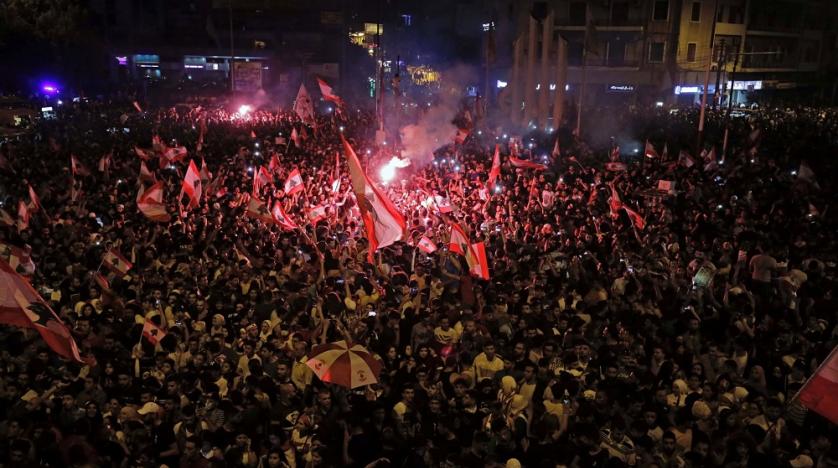For the last 13 days, the streets of Lebanon have witnessed some of the largest demonstrations in over a decade. From Tripoli in the north to Tyre in the south, people have gathered in the streets in the tens of thousands to protest austerity and a corrupt, clientelist political regime. What started as a protest against a tax on Whatsapp calls soon transformed into a full-blown indictment of an establishment that has increasingly worsened socio-economic conditions for the masses.
Lebanon has been in a state of paralysis for almost two weeks as schools, banks, and numerous businesses have remained shuttered after protesters took control of and blocked major roads. Calls for a “revolution” rapidly increased over the period and, as encaptured in the signature chant of “all of them means all of them,” the protesters have unequivocally demanded the ouster of the entire political establishment. Mass protests throughout last week drew over a quarter of the country’s population to the streets while this past Sunday nearly 170,000 people joined a human chain that spanned the whole country. General strikes, occupations, and blockades have further displayed an overwhelming rejection of the neoliberal politics that have divided and exploited the population for years.
Hariri Resigns
Although Prime Minister Saad Hariri was quick to repeal the “WhatsApp tax” after the first wave of mobilizations, protesters consistently pushed for more. In the face of a general strike, Hariri announced a set of reforms ranging from cuts to salaries of some current and former ministers and lawmakers to increases in pensions and back housing loans. His reforms, however, also included a set of public spending cuts that would pave the way for the privatization of essential services. In Lebanon, where over a quarter of the population lives in poverty and the national debt is 150% of the GDP, these “reforms” meant more austerity and offered no real change. Protesters overwhelmingly rejected these proposed reforms, knowing they can win more – the ouster of the regime.
In the face of this growing unrest, Hariri, on Tuesday, submitted the government’s resignation to President Michel Aoun, fulfilling one of the main demands of the movement. In a televised statement, Hariri said, “this is in response to the will and demands of the thousands of Lebanese demanding change.”
While the resignation represents a victory for the protesters, it is also a critical turning point in this current crisis. As of Wednesday, Auon has requested Hariri to continue leading a caretaker cabinet until a new one can be formed, effectively keeping him in power. It is likely that Aoun, who has to appoint Hariri’s replacement, will be unable to find consensus and will likely reappoint Hariri as Prime Minister to form a new cabinet. Such a move by the political establishment would do nothing but preserve the status quo that protesters have been fighting against for nearly two weeks. Hariri’s resignation also comes amidst increasing violence by Hezbollah supporters who have attacked protesters and ransacked protest sites in Beirut after their leader, Hassan Nasrallah, delivered an address criticizing the protests and warned Hariri against resigning.
What Next?
These October demonstrations have been the largest mobilizations in Lebanon since the Cedar Revolution of 2005 forced the withdrawal of Syrian troops from the region. Although Lebanon has seen mass protests and uprisings in recent years – during the Arab Spring and in 2012 and 2015 – these current mobilizations have far surpassed the others in scope.
One of the main causes for this success has been the unequivocal participation of the working class and youth. While protests in the past have largely been localized in Beirut and represented petty-bourgeois interests, the ongoing movement has spread to industrial and agrarian sectors across the country. This reflects a deepening anger at the political establishment and increased radicalization of the masses. Tripoli, a city in North Lebanon that has one of the highest concentrations of the working class and the poor, has transformed into a new locus of power for protests.
The youth and the working class in Lebanon are not alone. Across the world, the masses have taken to the streets in increasing numbers to confront the political establishment. Earlier in October, indigenous people in Ecuador rose up against the dissolution of fuel subsidies, forcing the government participate in negotiations with their movement’s leaders. In Chile, millions are organizing on the streets against neoliberalism, calling for the ouster of the president and the implementation of a Constituent Assembly. In Iraq, tens of thousands have descended upon Baghdad’s Tahrir Square to call for the end of the corrupt political regime. These are part of a long and growing list of instances of class struggle, including those in Haiti, Sudan, Puerto Rico, and more. The youth and the working class in Lebanon, as in other countries across the world, are coming into their power to challenge an exploitative capitalist system that has benefited from their oppression for far too long.
In Lebanon, from the early days, the protesters put forward two demands – for the resignation of political establishment, and for the appointment of impartial judges to run the country until new elections are called. But without organs of leadership within and of the working class, Lebanon is doomed to perpetuate the cycle of exploitation that is responsible for the iniquity of the current socio-economic condition. Over the past weekend, the military as well as members of Hezbollah have violently repressed protesters, from forcibly removing them from the streets to destroying and looting their camps. Hariri’s resignation creates an opportune climate for these alternate, bourgeois leaderships to fill the vacuum of power. But Hezbollah is not the only possible actor: the working class and youth that have been mobilizing could take full leadership–if they fight for it.
As professor and activist Rima Majed writes, “the past few days have shown the start of the emergence of a new class-based alliance between the unemployed, underemployed, working classes and middle classes against the ruling oligarchy.” In a country where the labor movement has been co-opted by the capitalist class, resulting in the systemic erasure of labor rights and protections, there is now an opportunity to foster organization that represents the interests of the most radical sectors of the movement, namely the working class, the youth, and women. Their role in the protests has been undeniable; when the leaders of the unions refused to call a general strike, the radicalized masses enforced one on their own by blocking major roads.
The demands in the streets is clear: “the people want the fall of the regime.” The working class in Lebanon has shown its capacity to force radical change, one that should not be squandered on half-wins. The outcome of the ongoing struggle will depend on whether a working-class alternative can be articulated and organized, one that targets capitalism as the root of people’s sufferings and recognizes the domestic and foreign bourgeoisie as their main enemy.











